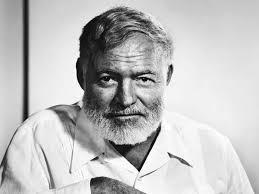How to conquer work paralysis like Ernest Hemingway
Curated from: bbc.com
Ideas, facts & insights covering these topics:
7 ideas
·6.47K reads
17
Explore the World's Best Ideas
Join today and uncover 100+ curated journeys from 50+ topics. Unlock access to our mobile app with extensive features.
"The best way is always to stop when you are going good and when you know what will happen next. If you do that every day when you are writing a novel, you will never be stuck."
ERNEST HEMINGWAY
319
2.12K reads
The “useful interruption”
It's a psychological trick to avoid work paralysis, inspired by Ernest Hemingway's discipline of writing and it means to stop a task when everything is going well.
You will be more motivated to get back to a task that you've interrupted when it was going well.
299
1K reads
Not finishing a task
Studies show that it can actually be beneficial.
To get all the positive effects from this (and to get back at it) you should feel that you are close to completing that task and you also should feel challenged enough by it, to care about its completion.
223
823 reads
"We need to have belief in ourselves – some kind of expectation that we can do something. And when we're closer to finishing something that we had previously failed to achieve, then that optimism increases."
EMMANUEL MANALO
222
737 reads
Gestaltism
It is a school of thought emerged in Austria and Germany in the early 20th century.
It was built of the belief that humans make sense of the world through patterns; thus, the whole picture was more important to us than its individual parts.
210
636 reads
Gestaltism and taks management
We can apply the belief of gestaltism (when we have parts of something, we always want to create a whole) to task management.
That means that we want to complete something if we have parts of it already figured out, especially if it's close to making sense or close to achieving some sort of goal.
202
513 reads
Task interruption and the need for closure
When an interruption happens and it stops us from completing a task, we tend to feel unsatisfied and in need of closure.
This interruption can provide a motivational boost and determine us to finish what we started, but it's not always the case.
190
633 reads
IDEAS CURATED BY
Never stop learning. Never stop educating yourself. When you stop learning, you stop growing & maturing!
Caleb E.'s ideas are part of this journey:
Learn more about personaldevelopment with this collection
How to set achievable goals
How to manage time for personal and professional life
How to avoid distractions
Related collections
Similar ideas
8 ideas
Driven to distraction? 7 top tips to stop procrastination when working from home - Sarah Townsend Editorial
sarahtownsendeditorial.co.uk
5 ideas
Why It's So Hard to Focus at Work
blog.doist.com
Read & Learn
20x Faster
without
deepstash
with
deepstash
with
deepstash
Personalized microlearning
—
100+ Learning Journeys
—
Access to 200,000+ ideas
—
Access to the mobile app
—
Unlimited idea saving
—
—
Unlimited history
—
—
Unlimited listening to ideas
—
—
Downloading & offline access
—
—
Supercharge your mind with one idea per day
Enter your email and spend 1 minute every day to learn something new.
I agree to receive email updates

